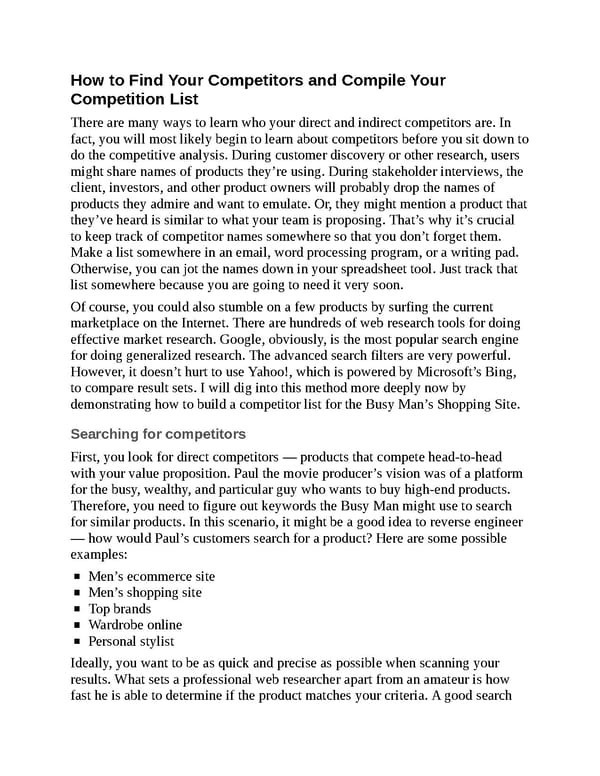How to Find Your Competitors and Compile Your Competition List There are many ways to learn who your direct and indirect competitors are. In fact, you will most likely begin to learn about competitors before you sit down to do the competitive analysis. During customer discovery or other research, users might share names of products they’re using. During stakeholder interviews, the client, investors, and other product owners will probably drop the names of products they admire and want to emulate. Or, they might mention a product that they’ve heard is similar to what your team is proposing. That’s why it’s crucial to keep track of competitor names somewhere so that you don’t forget them. Make a list somewhere in an email, word processing program, or a writing pad. Otherwise, you can jot the names down in your spreadsheet tool. Just track that list somewhere because you are going to need it very soon. Of course, you could also stumble on a few products by surfing the current marketplace on the Internet. There are hundreds of web research tools for doing effective market research. Google, obviously, is the most popular search engine for doing generalized research. The advanced search filters are very powerful. However, it doesn’t hurt to use Yahoo!, which is powered by Microsoft’s Bing, to compare result sets. I will dig into this method more deeply now by demonstrating how to build a competitor list for the Busy Man’s Shopping Site. Searching for competitors First, you look for direct competitors — products that compete head-to-head with your value proposition. Paul the movie producer’s vision was of a platform for the busy, wealthy, and particular guy who wants to buy high-end products. Therefore, you need to figure out keywords the Busy Man might use to search for similar products. In this scenario, it might be a good idea to reverse engineer — how would Paul’s customers search for a product? Here are some possible examples: Men’s ecommerce site Men’s shopping site Top brands Wardrobe online Personal stylist Ideally, you want to be as quick and precise as possible when scanning your results. What sets a professional web researcher apart from an amateur is how fast he is able to determine if the product matches your criteria. A good search
 UX Strategy: How to Devise Innovative Digital Products that People Want Page 86 Page 88
UX Strategy: How to Devise Innovative Digital Products that People Want Page 86 Page 88